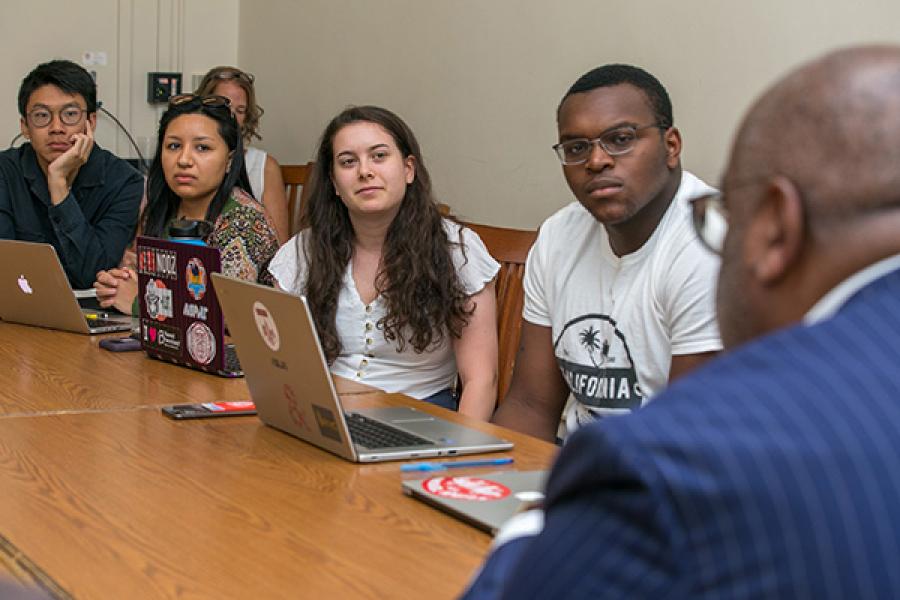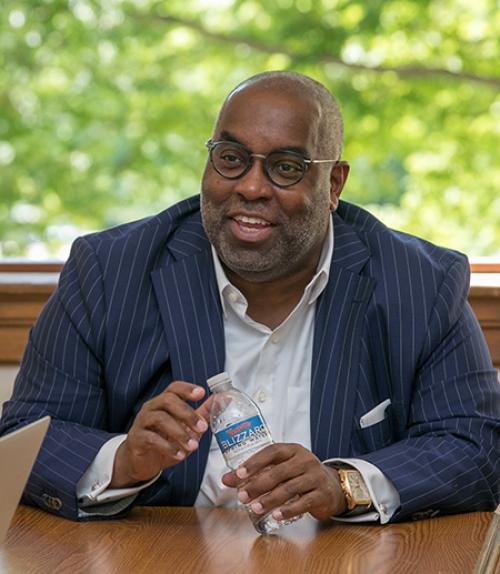Stephen Robinson ’81 J.D. ’83 assured undergrads during a Sept. 20 visit to campus that having 10 different jobs during your career is completely normal, and actually pretty exciting.
“Something within me just craves movement and change,” he said. “I like to conquer new environments.”
Robinson’s job-hopping has led to positions as a Deputy General Counsel in the FBI fighting against terrorists, as U.S. Attorney in Connecticut prosecuting public corruption and violent crime, working on high-profile criminal and civil cases as a federal judge and doing a stint as a private investigator in Brazil and Kuwait. He now handles white-collar crimes and government enforcement cases as a partner in the law firm of Skadden, Arps, Slate, Meagher & Flom in New York City. He is also a new member of the Cornell Board of Trustees, beginning his term in July.
“I only ever applied to three jobs,” Robinson said of the power of networking. “Every other time, someone just called me up and said that someone had told them ‘Stephen Robinson is your person.’ “
During his career conversation with a group of students in the College of Arts & Sciences, Robinson shared some of the important lessons he has gained during his legal career:- As an attorney, you’ll spend 98 percent of your time researching and writing. “You’ll spend about 30 to 40 hours working to prepare for 10 minutes in court,” he said. So, you’d better love the research and the writing part.
- Learn to listen to and deal with people who are wildly different from you, a skill he honed during his time at Cornell as an undergrad and a law student. “You have to be a person who’s comfortable sitting with anyone, hearing what they’re saying and often keeping your opinions to yourself.”
- Build relationships (and avoid awkward moments at parties) by developing a repertoire of questions you can ask people about themselves. Also practice the story you will tell when people ask you about yourself, making sure it’s interesting and memorable.
- After you meet someone you want to keep in touch with, take a few minutes to write down everything you learned about them so you can use it later to relate and connect.
- Even when you’re at a job that perhaps isn’t your dream job “give them excellent work every day.”
- Make the best of the situation you’re in, even if it’s a tough one. Robinson told students about his first job in a boutique law firm, as the first black person ever hired, and the directions a partner gave him on his first day: Never take off your jacket, never unbutton your top button, come in at 7 a.m. even though everyone else comes in at 8, don’t leave in the evenings until there are no more than a few partners left, spend time cleaning up and re-shelving books in the law library. These were not the same directions given to the white new associates. “There were a bunch of ways I could have taken those directions, but what I realized was that he was worried about what the other partners would think of me.” So instead of just being shocked at the overt racism, he worked hard, finding a way to operate in the system and eventually winning over a top partner who recommended him for his first government position with the U.S. attorney’s office in the Southern District of New York.
“The best advice I gained was a quote that Judge Robinson said which was, ‘Life isn’t about what happens to you, it's what you do with what happens to you,’ “ said Kyle Abrams ’20, a government major. “I found this quote and most of his talk to remind me to look at my career and opportunities I'm given as my chance to do something with the life that has been handed to me.”
Despite his career success, during his talk Robinson also emphasized the importance of family and friends. If you really want to become his friend, he said, ask him about his daughter, “Victoria—the most important person in my life.”
And he also shared the story of his “firefly dinners,” parties where he guides the format of the conversation to help people get to know each other more deeply by asking people to share one story in their lives where “something unexpectedly amazing” happened to them.
“People want to see that you hear them and want to know them,” he said. “People want intimacy and real relationships.” A lesson he says he applies in work, as well as in life.
For more information about Career Conversations, hosted by the College of Arts & Sciences Career Development Center, visit https://as.cornell.edu/careers or Handshake.
This story also appeared in Ezra.





